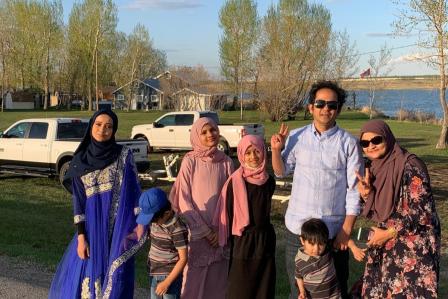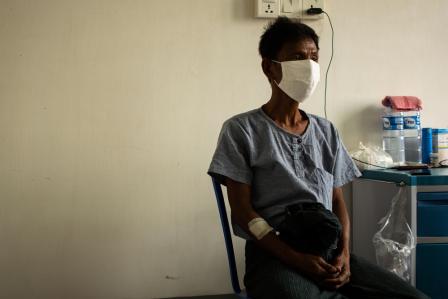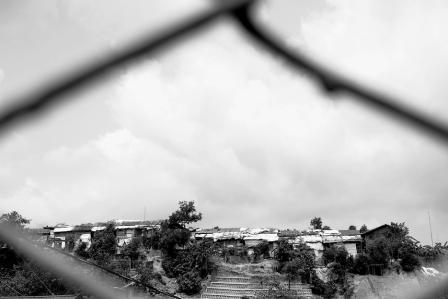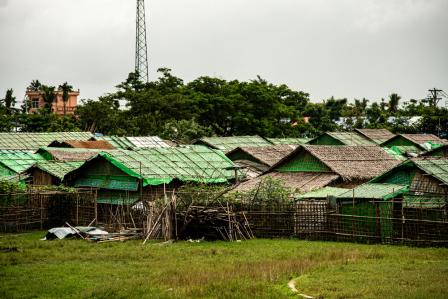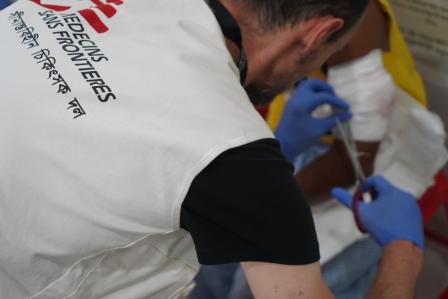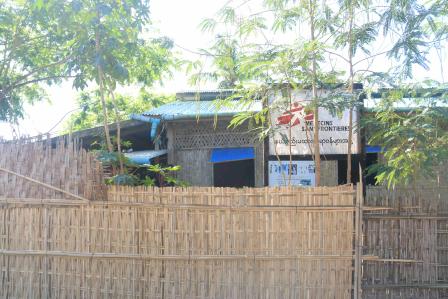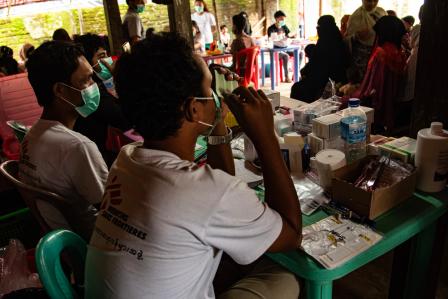Will I have the chance to meet them again?
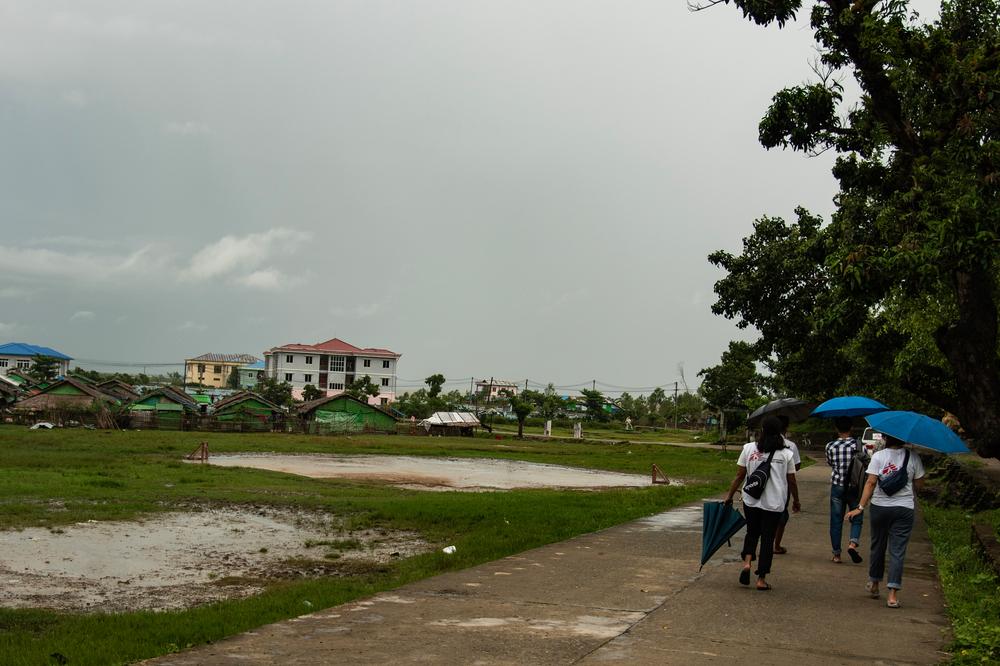
Doctors Without Borders staff walk past shelters in an IDP camp in Rathedaung home to ethnic Rakhine people.
On a rainy day in July 2023, I met Htwe*, a Rakhine patient living in an IDP camp in Buthidaung, Rakhine state in Myanmar. Her family had lost their house due to the conflict between the Myanmar Armed Forces and the Arakan Army in 2019. Htwe’s family and their neighbors were not able to go back to their home village. Once a battleground, the village was no longer a safe place. The presence of mines and the potential for clashes left them uncertain about their safety.
I conducted interviews with Doctors Without Borders patients, including ethnic Rakhine, Rohingya, and other minority communities, to understand their challenges in accessing healthcare. My Rohingya colleague, who speaks four different languages, interpreted my questions and Htwe’s responses in English and Rakhine language.
Suddenly, I heard familiar music and Korean lyrics from somewhere inside the bamboo house. I thought to myself, “I know this song, don’t I?” It turned out that Htwe’s teenage daughter was listening to K-pop music. Although I couldn’t tell the title, it seemed to be a song I had occasionally heard in back home in Korea. When I mentioned that I’m from Korea and that I was surprised to hear the music far away from my home, the three of us burst into laughter. I had the rare experience of sitting in an IDP camp in Rakhine State—which is now listed in South Korea’s travel ban list—and listening to a Rakhine patient’s story with K-pop playing at the background, alongside my Rohingya colleague.
Looking back after one year, it was such a special day, and I cherish everything about that day—the sound of the rain, the conversation among the three of us, and the moments of shared laughter amidst the challenging camp life in the rainy season.
With the immense support from my colleagues, I spent about a month meeting and talking with many Rakhine and Rohingya patients. When I left, I never imagined that I wouldn’t be able to see them again. Unfortunately, things changed rapidly after October 2023, as multiple parties simultaneously got involved in the armed conflict that escalated into a full-scale war in no time, affecting other states, including Rakhine. According to the UN, more than three million people are currently displaced in Myanmar. The number of people in need of humanitarian aid has sharply increased in many regions. Doctors Without Borders and other humanitarian organizations had to scale down or halt their operations due to insecurity, shortages of supplies and resources, and travel restrictions.
In Rakhine, most of the areas where Doctors Without Borders had been operating were heavily impacted by intensified conflict. In April 2024, Doctors Without Borders office in Buthidaung, including our pharmacy and medical supplies, was tragically destroyed in a fire caused by the fighting. That fateful day, we witnessed over 200 houses engulfed in flames, and thousands of people fleeing to a location near our office. The evolution has left our team in the area unable to provide essential humanitarian aid as they were uncertain about their own safety. Patients who were already relying on Doctors Without Borders mobile clinics and emergency referral services to secondary hospitals due to a lack of medical facilities now face a severe healthcare gap without minimal medical care. This includes children in need of basic medications and pregnant women requiring emergency transfers or cesarean sections, all left without any form of medical assistance.
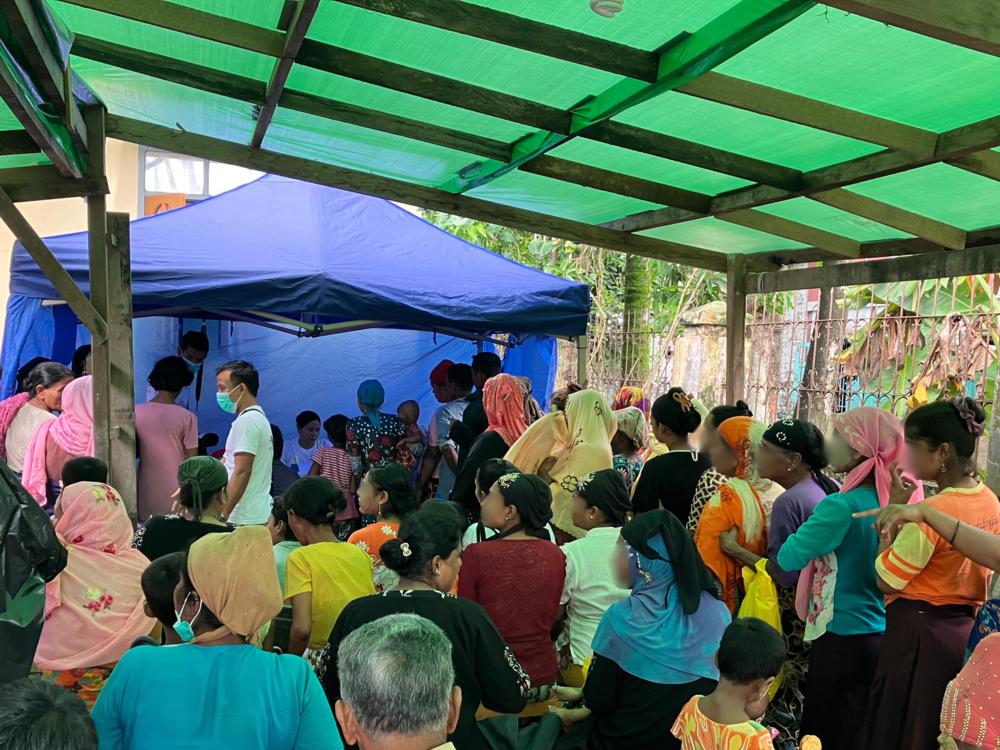
People crowd the waiting room of Doctors Without Borders' mobile clinic in Aung Mingalar quarter, Sittwe Township – the second mobile clinic ran by Doctors Without Borders since November 2023 when conflict erupted anew in Rakhine. At Aung Mingalar, hundreds of patients quickly filled the waiting room. Dozens of Rohingya and Rakhine women awaited their turn for a consultation in the maternity ward, illustrating unmet medical needs.
The conflict and suffering in Myanmar did not start recently. Since the military takeover in February 2021, instability has persisted across the country. As of 2023, over 6,000 civilians have died, and more than 1,000 medical facilities have been attacked. In Rakhine State, the Rohingya, an ethnic minority who have been exposed to targeted violence for decades, are now without any protection from any side involved in the conflict. It has been over seven years since approximately 700,000 Rohingya people fled Rakhine State to Cox’s Bazar, Bangladesh. The other hundreds of thousands of Rohingya in Rakhine State today are surviving amid increasing civilian casualties and escalating violence.
I departed from Myanmar on July 15 after completing 15 months of my assignment, which also marks a full year since the day we shared laughter at Htwe’s house in the IDP camp. Even now, as I write this from the comfort of my home in Korea, I am still unaware of the whereabouts of the many patients like Htwe, as well as my Doctors Without Borders colleagues I met there, nor have I any clue about most of my colleagues and their families, who also fled. I don't know if they are safe, unwell, or have access to food and water.
Words of my colleague "I am not sure if I would survive in the next hour," that he said during our last phone call in March still weigh heavily on my heart. I wonder if I will ever have the chance again to see my colleagues and the patients I met in Myanmar and hear their stories of survival and hardship. I hope for the day when humanitarian aid will reach the countless patients who are still living in displacement and fear across Myanmar.

